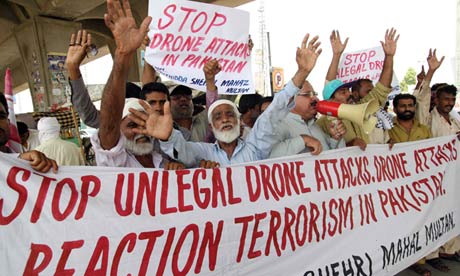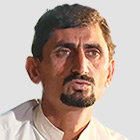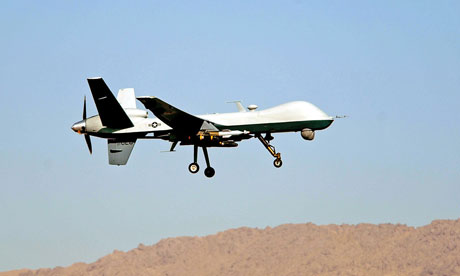Family of grandmother killed in US drone strike arrive for Congress visit
Rafiq ur Rehman discusses his family’s journey from Pakistan to Washington DC, where they will seek answers on Capitol Hill

Drawing on a pad of paper in a Washington DC hotel, Nabeela ur Rehman recalled the day her grandmother was killed. “I was running away,” the nine-year told the Guardian. “I was trying to wipe away the blood.”
“It was as if it was night all of the sudden.”
The date was 24 October 2012, the eve of Eid al-Adha, the Muslim holy day. Nabeela’s father, Rafiq ur Rehman, a school teacher living in the remote Pakistani tribal region of North Waziristan, was dropping off sweets at his sister’s home when it happened.
He had hoped to make the visit a family affair but his mother urged him to go alone. Rafiq did as she wished then stopped at the local mosque for evening prayers before taking the bus home. As the vehicle came to a halt at his stop, Rehman noticed something unsettling: members of his community were preparing to bury a body at a small graveyard nearby.
“I got a little worried,” Rehman said. He asked a boy what was going on. The child informed him that the mother of a man named Latif Rehman had been killed in a drone attack. The boy did not know the man he spoke to was Latif Rehman’s younger brother.

“That’s when I first knew,” Rehman said, describing how he learned of his mother’s death. The fruits Rehman had collected at the bazaar fell from his hands. “I just dropped everything. I was in a state of shock,” he said. Rehman feared the worst. He knew his children were with their grandmother. “I frantically ran to my house.”
Rehman arrived home to find that the charred remains of his mother had already been buried. Two of his children, Nabeela and her 12-year-old brother, Zubair, had been injured and taken to a nearby hospital, neighbors said. “At that point, I thought I had lost them as well,” Rehman said.
The children survived the attack, but their recovery process was just beginning. A year later, Rehman still has no idea why his mother, Momina Bibi, a 67-year-old midwife, was blown to pieces while tending her garden. Along with Nabeela and Zubair, Rehman has traveled to Washington DC to seek answers. On Tuesday, the family will appear before members of Congress to describe their experience, marking the first time in history that US lawmakers will hear directly from the survivors of an alleged US drone strike.
On Sunday, in their first interview with US media since arriving to the country and speaking through a translator, Rehman and his children described the day Momina Bibi was killed and their efforts since then to find justice. Zubair, now 13, said the sky was clear the day his grandmother died. He had just returned home from school. Everyone had been in high spirits for the holiday, Zubair said, though above their heads aircraft were circling. Not airplanes or helicopters, Zubair said.Drones.
“I know the difference,” Zubair said, explaining the different features and sounds the vehicles make. “I am certain that it was a drone.” Zubair recalled a pair of “fireballs” tearing through the clear blue sky, after he stepped outside. After the explosion there was darkness, he said, and a mix of smoke and debris.
“When it first hit, it was like everyone was just going crazy. They didn’t know what to make of it,” Zubair said. “There was madness.” A piece of shrapnel ripped into the boy’s left leg, just above his kneecap. A scar approximately four inches in length remains. “I felt like I was on fire,” he said. The injury would ultimately require a series of costly operations.
Nabeela, the little girl, was collecting okra when the missiles struck. “My grandma was teaching me how you can tell if the okra is ready to be picked,” she said. “All of the sudden there was a big noise. Like a fire had happened.
“I was scared. I noticed that my hand was hurting, that there was something that had hit my hand and so I just started running. When I was running I noticed that there was blood coming out of my hand.”
Nabeela continued running. The bleeding would not stop. She was eventually scooped up by her neighbors. “I had seen my grandmother right before it had happened but I couldn’t see her after. It was just really dark but I could hear [a] scream when it had hit her.”

Early media reports, citing anonymous Pakistani officials, claimed as many as four militants were killed in the attack. The strike drew the attention of an Amnesty International researcher, Mustafa Qadri, who was investigating drone attacks in Pakistan at the time.
“We got all sorts of different stories to begin with,” Qadri told the Guardian. “One was that [Bibi] was preparing a meal for some militants and that’s why she was killed. Another one was that there was a militant on a motorbike, right next to her. And then there’s this story of, that there was a militant in a jeep, SUV, with a satellite phone, at the exact point that she’s killed, but 10 minutes earlier. He used the phone and then he drives off into the distance. And then the drones come later and they kill her. So we found that that just really did not add up.”
Qadri reached out to trusted sources in North Waziristan. The family members and their neighbors were interviewed independently on multiple occasions, unaware that a human-rights group was behind the questions they were asked. Over the course of many weeks, Qadri found the family’s account to be consistent. He determined it was highly unlikely that any militants were present at the time of the strike and that the missiles were likely fired by a US drone.
“It was a number of things,” Qadri told the Guardian. “We got the missiles, the large fragments that the family has that we got analyzed by [an] expert who says this is very likely to be a Hellfire missile. We also had family members who saw drones physically. We also have the eyewitness of the family who said they heard the noise of missiles fired from the sky and then separate noises of missiles impacting on the ground. We have the evidence of a double sound, with each single strike.”
Among the most striking evidence that the attack was carried out by a US drone, Qadri said, was the “phenomenal accuracy” of the strike. “It physically hits her,” he said, referring to Momina Bibi. “She’s literally hit flush and is blown to smithereens.”
“It’s quite awful obviously … but in this sort of a situation where the body is destroyed, clearly she’s been targeted,” Qadri added. “They meant to kill this person.”
Qadri argues that US secrecy surrounding its so-called “targeted killing” program exacerbates an already complicated set of problems in Pakistan’s tribal regions.
“That secrecy, the unaccountability, the lack of lawfulness to it, is the key problem,” he said. “In the context of Pakistan and just in the very micro sense, I don’t think drones alone is the problem. It’s the way they’re used and it’s the way they’re used in isolation, ignoring the broader factors in that region.”
The State Department, in response to questions concerning the strike, directed the Guardian to the transcript of a 22 October press briefing by deputy spokesperson Marie Harf.
“There’s a process that goes into how these operations are chosen, and as part of that process, we take every effort to limit these casualties,” Harf said, echoing claims the president made in a counterterrorism speech in May.
The briefing fell two days before the one-year anniversary of Bibi’s death. It did not address the United States‘ alleged responsibility for the attack. The CIA, which runs drone programs in Pakistan, declined to comment on the strike. The agency suggested the Guardian contact the White House. The White House did not respond.
Nabeela spent most of her days with her grandmother. “I really liked my grandma,” she said. “I enjoyed following her and learning how to do things.” Zubair said his grandmother was liked by all. “There’s no one else like her. We all loved her.” In the year since his mother’s death, Rehman said, life has changed dramatically. “Not having her is as if a limb has been cut,” he said.
For Rehman’s father, a respected headmaster a local school, the death of his wife has been devastating. The couple was unaccustomed to being apart, Rehman said. “After my mom’s death, we haven’t really seen our dad smile. It’s like he doesn’t have any more will for going on.”
Rehman’s journey to the US was the idea of his attorney, Shahzad Ahkbar, an internationally-known critic of US drone policy. In the weeks following Bibi’s death, the US documentary filmmaker Robert Greenwald traveled to Pakistan to shoot for a forthcoming film on drone attacks, Unmanned: America’s Drone Wars. Ahkbar introduced Greenwald to Rehman and his family.
“I could never have imagined that I would be coming to America or I’d want to come to America. I didn’t know how people were,” Rehman said. “But then Robert had come and they were listening to our story and then Shahzad, our lawyer, had told us that there are more people like Robert who would love to hear the truth and know the truth.”
Greenwald said: “When I was in Pakistan, interviewing a whole series of people, they stayed in my mind. At the moment when I was interviewing them I had this very strong feeling that it would be very helpful if Americans could see and experience a father, a teacher, children, the loss of a mother, the loss of a grandmother. Those are universals.
He added: “On the policy side, I hope the briefing will begin the process of demanding investigation. Innocent people are being killed.”
US officials say the White House does have a count of civilian drone-strike casualties. The figure, they say, is considerably lower than publicly available counts. The administration has declined to disclose its number, however, citing national security. “Some things will never be able to be made public so we can protect, indeed, our ability to continue conducting these operations to, indeed, protect our country,” Harf said last week.
 Congressman Alan Grayson.
Congressman Alan Grayson.
Together Rehman, his attorney and the US director set out to bring the family to the US. For months they worked to secure paperwork for the children (who lacked birth certificates). Eventually Alan Grayson, a Democrat from Florida, and a number of others extended a formal invitation. A hearing was scheduled for last month, but the event was postponed when the US state department declined to issue a visa for Ahkbar.
“I ideally wanted to come with my lawyer and it was very unfortunate that he couldn’t come along with me,” Rehman said. Despite the setback, he continued. With Grayson’s help, the family secured the Tuesday briefing in Congress.
The purpose of the briefing, Representative Grayson told the Guardian, is “simply to get people to start to think through the implications of killing hundreds of people ordered by the president, or worse, unelected and unidentifiable bureaucrats within the Department of Defense without any declaration of war.”
“Under many people’s view of international law, they’re all illegal. All these attacks are illegal. The UN charter, as was discussed with great vehemence during the recent debate about military intervention in Syria, the UN charter sanctions the use of force only when a country is under attack, in self defense, or when it’s been sanctioned by the UN security council.
“It is an abuse of the term ‘self-defense’ to say that our launching drone attacks in Yemen or elsewhere in the world qualifies. The fact that the technology is there doesn’t change the fact that it’s a use of force that ends up killing people.”
Rehman described the message he hopes to convey to the American people through the briefing: “I want them to know the drones are having an impact on our lives.”
“It’s hitting our elders. It took my mom. It’s affected my children and we haven’t done anything wrong.”



